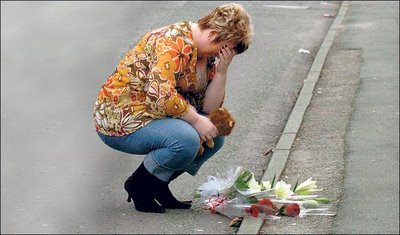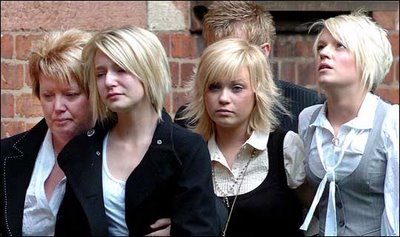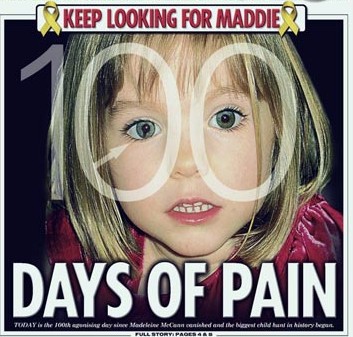 After reading out her list of grievances at the conclusion of the trial of the teenagers charged with her husband's murder, Helen Newlove's back, this time with a more expanded one, and all give ample space in the Scum.
After reading out her list of grievances at the conclusion of the trial of the teenagers charged with her husband's murder, Helen Newlove's back, this time with a more expanded one, and all give ample space in the Scum.
The main article, headlined "Mourning mum could be YOU", has to be one of the most hackneyed and pathetic attempts for sympathy that a newspaper could conjure up.
Mum-of-three Helen, 45, fought back tears as she made her first heartbreaking return to the spot where her loving husband of 21 years was brutally murdered by a pack of teenage savages.
...
Helen moved away from the family home with daughters Amy, 13, Danielle, 15, and Zoe, 18. But the grief-stricken family summoned up the courage to return there in front of our cameras in order to press home their call for action.
Or, in other words, to get a photograph of Helen crying so she can express just how much she means it, and how badly her demands must be acceded to by the politicians the Sun spends so much time decrying.
Arm-in-arm, heads bowed to hide the pain and sorrow etched on their faces, mum and daughters approached the spot where Garry was found dying 100 yards from his front door.
Once there, they knelt to place flowers and said a silent prayer to their fallen hero, a miracle dad who had beaten cancer 15 years previously. Carrying a photo of her beloved husband – and clutching his favourite cuddly toy, Leo the lion – Helen said: “It’s traumatic just to be here. It’s still so raw and so painful but we had to come. Leo the lion stands for courage. We gave him to Garry to give him courage when he was in hospital fighting cancer. We brought him along today to give us that same courage. Leo goes everywhere with us now.”
Turning to hug her tearful girls, Helen added: “This is so much harder for them. But if people witness the pain we’re going through, they might just sit up and take notice.
Or they might just think that you're milking your understandable grief and anger to make a political point that politicians are incapable of disagreeing with for fear of being called heartless, cold and indifferent to those who are victims of crime. That's exactly what you're doing, and it's unfair both to all the other parents that have lost children or families that have lost parents to thugs but who haven't decided that it demands that something must be done, and that sad as it seems, it unfortunately happens, and will continue to happen regardless of any campaign. More than anything, it's deeply cynical.
What then, are Newlove's demands? Would you believe that they tie in almost directly with the Sun's own viewpoints?
Sentences that fit crime
THERE are decent, sensible judges in this country, but too often their hands are tied by barmy guidelines and nonsense about human rights.
To stem yob violence we need real deterrents before it’s too late.
We have a mandatory life sentence for murder, but I fear Garry’s killers will escape with as little as ten years each behind bars.
That’s not justice. They will be out on the streets at half his age. For me, life should mean life, and at the very least 25 years. Surely it is time to re-open the debate about bringing back the death penalty — or at least the birch? These people deal in pain - it’s the only commodity they understand.
If Garry’s killers were put to death I would feel absolutely nothing for them. Why should I? They knew full well they were committing the most heinous of all crimes.
Ignoring the jibe about human rights, in actual fact, judges under the last Criminal Justice Act to come into effect have been given far more power over the sentences they can hand down. Life should only ever mean life in the case of multiple murders, or where the offender poses a distinct, special threat to the public, and judges can also now opt for an "indeterminate" sentence if they feel that's the case. The few in prison that are on effective life sentences - Ian Huntley, Ian Brady, Peter Sutcliffe, etc - are those that do genuinely deserve them. It should also always be the judge and not a politician that decides on what requires a life sentence that means life, for obvious reasons. As for bringing back the capital punishment or the birch, apart from the fact that the former doesn't work as anything approaching a deterrent as America aptly demonstrates, it brings us down to the level of those who commit the crimes themselves. A yob beats someone up, so we give him a good state-sanctioned thrashing in return? A wonderful example, to be sure. I also doubt that when they beat her husband up that they had the intention of killing him, whatever despicable bravado they've since displayed.
YOU rarely meet a cop these days, if you do they are often overweight.
This is because most of them drive around instead of being where people need them — on the streets.
Really? I think it's a long time since I've seen an overweight police officer, but then what do I know? I haven't had my husband killed.
We’re entitled to a proper response to every 999 call. CCTV and community support officers are no substitute for a bobby on the beat.
A proper copper knows his beat. He can sense trouble and intervene before it’s too late. And officers need to be fit and strong.
And I'm sure that the Sun will be delighted with the rise in taxes necessary for every community, street, or estate to have its own individual set of police officers, as will those that have no need for them. We already have around 140,000 police officers, and over 15,000 community support officers. Exactly how many more are needed, or necessary? A far better idea would be genuine community policing, not necessarily involving the law itself but active citizenry and groups working together to nip problems in the bud themselves. That though might make too much sense, or involve trying to rebuild a sense of community that has vanished through the rise of ruthless individualism.
I’VE worked in courts and seen the justice system from both sides.
All too often the victim’s family are made to feel like second-rate citizens. Their rights come second to the rights of perpetrators.
Or as they're also known until convicted, the accused.
When Garry’s killers stood trial, the defendants came to the dock smiling and laughing. They were staring at us as if we were scum.
Nobody told them to pack it in. We were the ones told not to show emotion or call out in case it swayed the jury. Why wasn’t there a place for us to watch proceedings free from the menacing glares of yobs?
Why didn't you make a stand and ignore the advice? If you can do this now, why not then? Besides, the layout of most courts often means that those in the dock have to turn right around to stare at those in the public gallery. We could put closed off sections into courts or curtains, but why when most of the time they wouldn't be used? She perhaps does have something a point when they could watch proceedings in a side room via CCTV, but surely most also want to be in there and experience what's going on as well as watch?
I’m so angry at the way these kids play the system. The law says children of ten know what’s right and wrong — so why do we treat teenage killers like babies? They can have their mums sit with them and get refreshment breaks. No wonder court holds no fear for these kids.
Possibly because children mature at different ages, especially as we don't consider them adults until either 16 or 18. Again, they're not killers until they're convicted, and it's worth pointing out that not all of those tried for Newlove's murder were convicted. That's been conveniently forgotten.
BAD parenting is at the heart of Britain’s demise.
We live surrounded by incredible technology — yet some kids behave as if it was the dark ages.
When are lazy parents going to realise life is not a soap opera or a PlayStation game? I’ll tell you — when we strip their benefits, fine them heavily and shame them in the papers.
All of which has been shown to work so effectively in the past.
Parents need to instil respect in kids and teach them right from wrong. If kids run wild their parents should be hauled into court alongside them. And if kids get community service, the parents should have to join them. Courts come down hard on pensioners who don’t pay council tax. So why pussyfoot around parents who don’t give a damn? And I’m sick of women playing the single mum card.
But this also risks punishing parents when they've tried their hardest. How many youths commit the odd offence, mostly receive a caution and never do anything like it again? You can imagine the parents becoming embittered if also having to attend community service meant them losing their jobs. How would impoverishing families impress upon them the need to bring their children up right, or indeed enable them to do so? It might be reasonable for repeat offences, but not in all cases. The council tax example is also ludicrous: perhaps one or two get sent to prison a year for refusing to pay, if that.
... When a head expels a violent pupil I want him or her to decide without having to explain it over and over or fill out endless forms. A head should be judge and jury without having his authority questioned. Teachers should also be free to intervene if they see a fight without the fear of losing their job.
Except the appeals process has time and again shown that decisions over expulsions are often made hastily and without thinking out the consequences. As for teachers intervening in fights, in all my years at school I never saw them being in the slightest bit afraid of breaking them up or cracking down hard on those who did.
And they should have the right to search pupils for drugs or weapons - a child who has nothing to hide won’t mind.
There's no better way to earn the respect of someone than to spend every morning either frisking them for something they haven't got or peering into their pockets using x-ray machines or metal detectors. There's a lyric that seems to sum this up: "And our schools look like prisons / and our prisons look like malls."
Finally, there's the Sun's leader:
ONE minute, Gordon Brown claims crime has fallen under Labour. The next we learn gun and knife deaths have spiralled by a chilling 20 per cent in one year.
There's nothing like selectively relying on the figures. Overall, homicides were down last year, and gun crime was also down. The quarterly figures showed a rise from 49 deaths involving guns to 59, but then the annual figures to September last year showed them falling back down to 49. Deaths involving knives were up from 219 to 258, which perhaps shows a change in weaponry or the force used, or even failings in hospitals. It's difficult to tell.
Yesterday, Justice supremo Jack Straw promised new prisons — but don’t hold your breath. Today we discover 3,000 violent offenders are being released early because jails are full.
By a whole 18 days, and those that have re-offended have done so on a surprisingly low level. The Sun and others' demands led to the overcrowding crisis, yet all they want now is.. more prisons and ever harsher crackdowns. Just where does it all end?
Ministers seem hopelessly adrift.
But as murder victim Garry Newlove’s devastated widow Helen points out today, there is a simple remedy.
More bobbies on the beat, tough action at home, discipline in schools and real justice in court.
It comes to something when a bereaved wife and mum can come up with a better cure for crime than our cops and politicians.
Except it's the same cure that's been tried for over a decade and which in their opinion has so egregiously failed.
Where is the liberal response to this sabre-rattling? Where is the politician brave enough to stand up and say, yes, there are problems in certain areas, just as there always has been and always doubtless will be but that we'll try as hard as possible to try to change? That the the police, good as they are and as hard as they work, cannot be everywhere at once? Where despite populists and opportunists claiming that Britain is either broken or a failing society, by most accounts we're doing quite well, and up until recently, the middle classes, unlike the poor and vulnerable, have never had it so good? Or indeed, to end all taboos and stand up to a bereaved person and tell them that grief or anger is never a good motive for change and that their solutions are not necessarily the best ones? The Liberal Democrats have said they'll oppose any return to the "sus laws", but where are they or indeed anyone else with different solutions or suggestions that don't involve either the military, the birch, a "rebalancing" of the criminal justice system or ever more prison spaces? It's time that the narrative was changed and that the needle was taken off the broken record.Labels: anti-social behaviour, crime, crime policies, Garry Newlove, grief industry, Helen Newlove, reacting, Scum-watch, Sun-watch, youth crime




